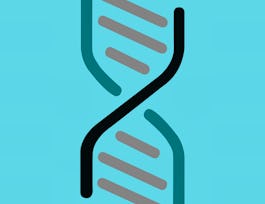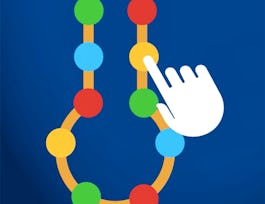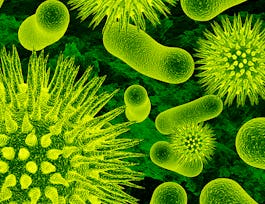Are you a living creature? Then, congratulations! You’ve got DNA. But how much do you really know about the microscopic molecules that make you unique?


DNA Decoded
Taught in English
Some content may not be translated
40,878 already enrolled
(1,208 reviews)
Details to know

Add to your LinkedIn profile
28 quizzes
See how employees at top companies are mastering in-demand skills


Earn a career certificate
Add this credential to your LinkedIn profile, resume, or CV
Share it on social media and in your performance review

There are 4 modules in this course
In this module, we'll explore the molecular structure of DNA. What is DNA? What are the basic building blocks of DNA? Where can you find DNA within a cell? We'll learn about how James Watson and Francis Crick were able to solve the riddle of the molecular structure of DNA by building on the work of other scientists. Their groundbreaking discovery revealed that four nucleobases (adenine, thymine, cytosine, and guanine) combine with sugar and phosphate molecules to form the familiar double helix of DNA. We'll take a look at how the molecular structure of DNA regulates its functions; for example, how the chemical bonds (covalent and noncovalent) between these molecules allow DNA to "unzip" during replication. Then we'll take a look at how you manage to fit over three billion base pairs into each of your cells. (Here's a hint: Histones, nucleosomes, and chromosomes would be great at packing for a trip!)
What's included
7 videos4 readings6 quizzes4 discussion prompts
We've all heard DNA described as "the blueprint of life," but what does that actually mean? Each one of the approximately 20,000 genes in our bodies contains the instructions for building a protein. In this module, we'll explain how RNA copies the genetic information contained in our genes and uses this information to assemble amino acids into proteins. Scientists call this concept "Central Dogma": DNA makes RNA and RNA makes protein. We'll also explore how we transmit genetic information from one cell to another -- and what happens when things go wrong. Along the way, we'll learn about techniques (such as polymerase chain reactions and gel electrophoresis) that forensic scientists use in DNA fingerprinting. Join us this week for murder and mayhem in the lab!
What's included
8 videos4 readings9 quizzes2 discussion prompts
In this module, we'll explore the techniques scientists use to manipulate DNA. Genetic engineering has allowed us to increase crop yields, diagnose illnesses, develop vaccines, and manufacture insulin. By carefully selecting a pair of molecular scissors (restriction enzymes), scientists are able to isolate a gene of interest and insert it into plasmid DNA, turning a common bacteria (E. coli) into a molecular copying machine. This week, we'll learn that mutations are genetic errors, but that not all mutations are necessarily bad — in fact, some mutations confer a selective advantage that protects against disease. We'll explain what genetically modified organisms are (and what they are not) and weigh in on the heated debates about the ethics and safety of GMOs in popular media.
What's included
8 videos5 readings7 quizzes4 discussion prompts
What does your DNA say about you? You may have heard that you share 99% of your genetic material with everyone else on the planet. That's true, but this week we're going to take a look at the less than 1% that makes you unique. We'll kick off by discussing the Human Genome Project, the massive scientific collaboration that mapped out the sequence of all our genetic material. The technologies developed while mapping out the human genome ushered in a new age in DNA research. Now, genome-wide association studies can analyze massive amounts of data, searching for genetic variations that are associated with particular diseases. Pharmacogenomics may help determine which drugs are likely be most effective for you. Genetic genealogy tests (such as Ancestry DNA, 23 and Me, and Family Tree DNA) will allow you to trace random mutations in your DNA that can provide clues to your ethnic heritage. As an added bonus, we'll discuss whether it would be possible to revive extinct species by studying ancient DNA.
What's included
9 videos7 readings6 quizzes4 discussion prompts
Instructors

Offered by
Recommended if you're interested in Basic Science

University of Illinois at Urbana-Champaign

Rice University

Stanford University

University of Leeds
Why people choose Coursera for their career




Learner reviews
Showing 3 of 1208
1,208 reviews
- 5 stars
86.60%
- 4 stars
11.33%
- 3 stars
1.57%
- 2 stars
0.41%
- 1 star
0.08%
New to Basic Science? Start here.

Open new doors with Coursera Plus
Unlimited access to 7,000+ world-class courses, hands-on projects, and job-ready certificate programs - all included in your subscription
Advance your career with an online degree
Earn a degree from world-class universities - 100% online
Join over 3,400 global companies that choose Coursera for Business
Upskill your employees to excel in the digital economy
Frequently asked questions
Access to lectures and assignments depends on your type of enrollment. If you take a course in audit mode, you will be able to see most course materials for free. To access graded assignments and to earn a Certificate, you will need to purchase the Certificate experience, during or after your audit. If you don't see the audit option:
The course may not offer an audit option. You can try a Free Trial instead, or apply for Financial Aid.
The course may offer 'Full Course, No Certificate' instead. This option lets you see all course materials, submit required assessments, and get a final grade. This also means that you will not be able to purchase a Certificate experience.
When you purchase a Certificate you get access to all course materials, including graded assignments. Upon completing the course, your electronic Certificate will be added to your Accomplishments page - from there, you can print your Certificate or add it to your LinkedIn profile. If you only want to read and view the course content, you can audit the course for free.
You will be eligible for a full refund until two weeks after your payment date, or (for courses that have just launched) until two weeks after the first session of the course begins, whichever is later. You cannot receive a refund once you’ve earned a Course Certificate, even if you complete the course within the two-week refund period. See our full refund policy.



